Exploring The Ecological Consequences Of Power Washing
Exploring The Ecological Consequences Of Power Washing
Blog Article
Content By-Fraser Powell
Pressure cleaning aids surface areas last much longer, reducing the need for substitute and the associated environmental effect. It likewise minimizes air pollution by removing bacteria, vermin, and various other damaging substances from surface areas.
However pressure cleaning needs a lot of water, and the extreme use of this source can stress regional water materials. Some cleaning cleaning agents likewise have chemicals that can clean into nearby rivers, harming wildlife and interfering with environments.
Water usage
While the use of pressure washing machines can be good for a residential property's cleanliness, it is very important to note that the procedure makes use of a lot of water. It can also include soap and various other cleansing chemicals that are bad for the dirt. Additionally, when the soap and various other chemicals rinse into the sewer, it can negatively affect the water quality in the nearby location.
In addition, some chemical detergents such as muriatic acid and trisodium phosphate (TSP) are toxic to plants and animals. These chemicals can eliminate grass and various other sensitive plants when revealed to them. Luckily, lots of stress washing business now prevent using these damaging chemicals and rather choose even more environmentally friendly items such as naturally degradable cleaners.
Going green is a priority for numerous property managers since it reduces the need for natural deposits. By maintaining exterior surface areas in good condition, homeowner can prevent costly replacements and prevent adding to the ecological impact of production and delivering new products.
Energy intake
Stress washing is a terrific method to remove hazardous growths like mold and mildew, which can influence indoor air quality. It also kills spores and develops a setting much less welcoming to vermin, safeguarding people from illness.
Conventional stress washing uses considerable volumes of water integrated with severe chemical cleaning agents, which can cause ecological damages. This wastewater can infect groundwater and damage bordering plants and wildlife. Furthermore, much of these chemicals are non-biodegradable and can continue the setting for extended periods of time.
By using environmentally friendly cleaning options and utilizing low-pressure settings, it is possible to minimize the environmental impact of this process. Additionally, by recording and redirecting the wastewater, it is feasible to limit the amount of contamination that winds up in tornado drains pipes. This reduces the threat of fines from neighborhood EPA inspectors and aids to promote your business's business responsibility. Furthermore, today's green cleaning chemicals have the very same effective cleaning capabilities as typical items and can help you fulfill EPA regulations.
Disturbance of delicate ecosystems
The strong water spray from stress washing can disrupt and displace delicate communities, such as gardens, lawns or all-natural habitats. This can result in the loss of essential nutrients or stifle wild animals. Additionally, the energy made use of to power pressure washing machines adds to carbon emissions and environmental pollution. Using extra energy-efficient devices and alternative cleansing methods can help minimize this influence.
Additionally, the cleaning agents made use of in stress washing can wash away into neighboring waterways, creating chemical overflow that may hurt marine life or contaminate water sources. Using biodegradable detergents is one means to minimize this threat.
As the demand for environmentally friendly cleaning options expands, a lot more manufacturers are producing environment-friendly pressure washers. These machines supply the same cleaning results as typical machines yet are designed to be extra eco lasting. In addition, these makers are normally much more efficient and call for less water. This can cause substantial savings on both the expense of energy and water intake.
Hazardous chemicals
The cleaning agents made use of in power washing are normally made with all-natural active ingredients and are biodegradable, so you do not have to worry about them polluting watersheds or entering sewer systems. However, https://charline0ronald.wordpress.com/2024/04/16/unlocking-the-enigma-of-pressure-laundering-a-guide-to-the-principles/ may leave a residue that can harm plants with revealed vegetation, so see to it you adhere to best management methods for containment and clean-up.
The chemicals that are released during pressure washing can also trigger breathing problems. This is since the contaminants are blown into the air and can be breathed in. This is especially damaging for people with bronchial asthma or other respiratory problems.
Dust, moss, and gunk develop on the outside of buildings and outdoor surface areas. Over time, they can eat away at paint and concrete sealant and create rust. https://kotaku.com/powerwash-simulator-xbox-game-pass-tips-tricks-guide-1849194998 can remove these pollutants before they cause severe damages and boost the life expectancy of products. For property owners, it's a great method to raise aesthetic appeal and reveal great upkeep habits.